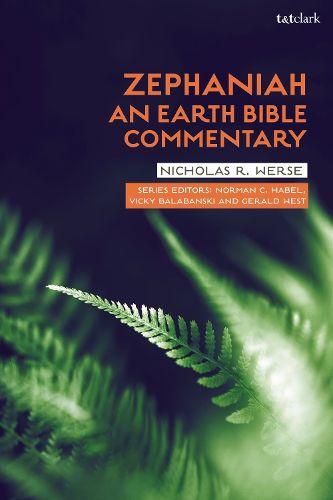Readings Newsletter
Become a Readings Member to make your shopping experience even easier.
Sign in or sign up for free!
You’re not far away from qualifying for FREE standard shipping within Australia
You’ve qualified for FREE standard shipping within Australia
The cart is loading…






With astute attention to Zephaniah's intertextual relationships with other biblical texts, Nicholas R. Werse explores the implications of Zephaniah as a book in perpetual conversation with other biblical cosmologies and conceptions of the human place in relationship with creation. Werse guides readers to critically examine Zephaniah's ancient worldview and subsequent legacy in dialog with the world's modern ecological crises.
Werse argues that Zephaniah begins and ends with the land. It begins with the removal of all life from the land and ends with a proclamation returning the exiles to their ancestral home. Along this journey, all three chapters of Zephaniah systematically reverse language and imagery from Gen 1-11 and draw deeply from the language of earlier prophets to depict the 6th century BCE destruction of Jerusalem as nothing short of the unravelling of creation. While remaining suspicious of Zephaniah's distinctively androcentric worldview, Werse traces Zephaniah's rhetorical journey from the deconstruction of creation and the nations, to its proclamations of hope for the future.
$9.00 standard shipping within Australia
FREE standard shipping within Australia for orders over $100.00
Express & International shipping calculated at checkout
With astute attention to Zephaniah's intertextual relationships with other biblical texts, Nicholas R. Werse explores the implications of Zephaniah as a book in perpetual conversation with other biblical cosmologies and conceptions of the human place in relationship with creation. Werse guides readers to critically examine Zephaniah's ancient worldview and subsequent legacy in dialog with the world's modern ecological crises.
Werse argues that Zephaniah begins and ends with the land. It begins with the removal of all life from the land and ends with a proclamation returning the exiles to their ancestral home. Along this journey, all three chapters of Zephaniah systematically reverse language and imagery from Gen 1-11 and draw deeply from the language of earlier prophets to depict the 6th century BCE destruction of Jerusalem as nothing short of the unravelling of creation. While remaining suspicious of Zephaniah's distinctively androcentric worldview, Werse traces Zephaniah's rhetorical journey from the deconstruction of creation and the nations, to its proclamations of hope for the future.